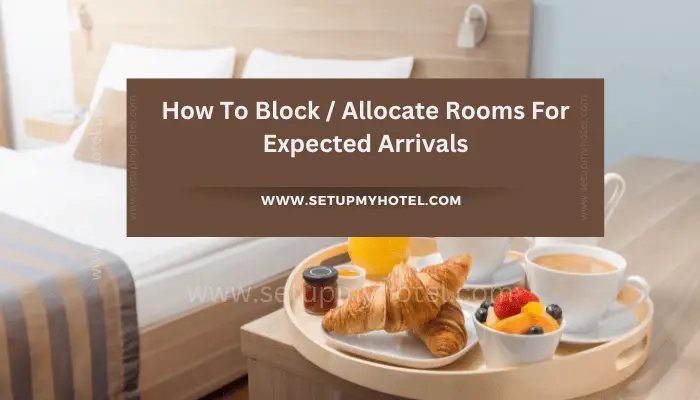Tips for Blocking/Allocating rooms for expected arrivals
One of the most important aspects of running a successful hotel is ensuring that guests have a comfortable and enjoyable stay. One key factor in achieving this goal is making sure that guests are assigned appropriate rooms upon arrival. There are a few different strategies that hotels can use to accomplish this.
One option is to block off rooms in advance based on expected arrival dates. This can be done manually or with the help of software that tracks reservations and occupancy levels. By reserving rooms for guests who have already booked their stay, hotels can ensure that they have enough space to accommodate everyone.
Another approach is to allocate rooms as guests arrive. This can be a bit more challenging, as it requires hotel staff to quickly assess the needs and preferences of each guest based on factors like group size, special requests, and accessibility needs. However, when done well, this approach can help hotels create a more personalized experience for their guests.
Room blocking is a part of the guest pre-registration activity, This will help plan the hotel to meet the special requirements of guests as well as a proper room allocation for the hotel. In Some hotels, this process is done one or two days in advance.
Although the reservation department may block the desired rooms in advance, it is the responsibility of the front desk to assign guest rooms as per the specific requirement made by them at the time of reservation. The below points will help you to achieve proper room blocking.
1) Print a detailed arrival list for the next day’s arrival. Which shows additional guest details like arrival date, departure date, room type booked, room rate, VIPVery Important Person status, previous number of stays, time of arrival, gender, room-specific features ( smoking / non-smoking), guest-specific features, etc.
2) BlockAn agreed-upon number of rooms set aside for members of a group planning to stay in a hotel. rooms according to the booked room type of the guest. If the room type is not available then try to upgrade according to the availability and hotel policy.
3) If there is a room-specific request like smoking / non-smoking, away from the elevator, etc then look for a room which is matching this requirement and then allocate the room.
4) If you are blocking a connecting room (a room that is departing and you are blocking the same to another arrival for the day) then always check the arrival time of the guest. Give enough time for HK to prepare the room for the next arrival.
5) Take special care while blocking rooms for VIP guests after blocking the room you may put a ‘Trace’ or send a requisition voucher to another department for placing VIP amenities in the room. If the PMS / hotels software has a feature to superblock these rooms then activate this feature. This will ensure that no other front desk staff can de-block and allocate this room for another guest.
6) While upgrading a guest to a higher category you must always consider his no previous visits, room rate, the importance of the client if the booking is from the corporate, designation of the guest, etc.
7) For single ladies do not block an inter-connecting room, Also if your hotel has a separate ladies’ floor/rooms then block those.
8) Room allocation has to be done as per the status of the reservation confirmed/guaranteed bookings to be blocked first. WaitlistedReservation kept on hold due to the hotel is overbooked. / TentativeWhen the reservation is waiting for bookers confirmation. bookings can be blocked later.
9) GuestDefinition of Guest in Hospitality Industry: A guest is the most important person in any business. A... with disabilities may need rooms fitted to their functional needs, special amenities, or services required at the time of reservation. It is always advisable to superblock these rooms well in advance.
10) Some Frequent guests might be very particular about specific rooms which they enjoy most and stay regularly. Try and block this room for these guests.
Ultimately, the best approach for a given hotel will depend on a variety of factors, including the size of the hotel, the types of guests it typically serves, and the resources available to manage room assignments. By carefully considering these factors and experimenting with different strategies over time, hotels can find the best approach for their unique needs.











